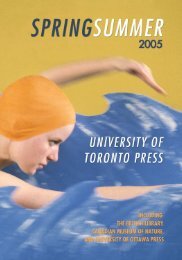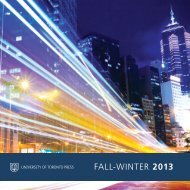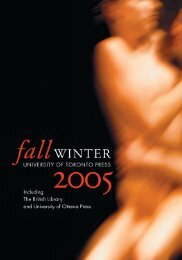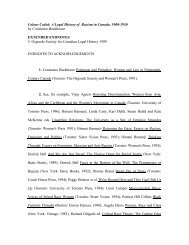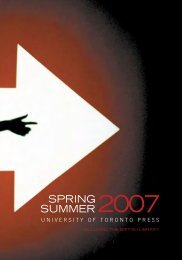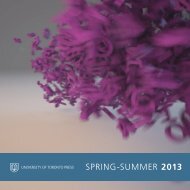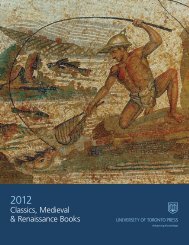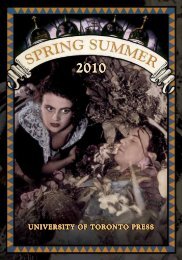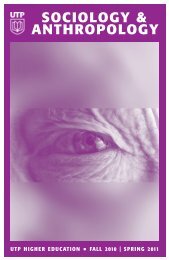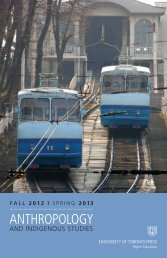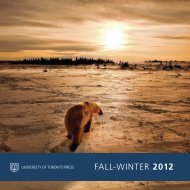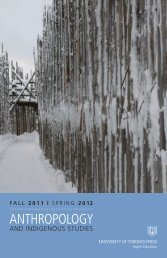Fall/Winter 2006 - University of Toronto Press Publishing
Fall/Winter 2006 - University of Toronto Press Publishing
Fall/Winter 2006 - University of Toronto Press Publishing
You also want an ePaper? Increase the reach of your titles
YUMPU automatically turns print PDFs into web optimized ePapers that Google loves.
G E N E R A L I N T E R E S T<br />
‘Call Me Hank’<br />
A Stó:lõ Man’s Reflections on Logging, Living, and Growing Old<br />
Hank Pennier<br />
Edited by Keith Thor Carlson and Kristina Fagan<br />
‘My name is Henry George Pennier and if you<br />
want to be a friend <strong>of</strong> mine please you will call me<br />
Hank.’ So begins ‘Call Me Hank,’ the autobiography<br />
<strong>of</strong> Hank Pennier (1904–1991): logger, storyteller,<br />
and self-described ‘halfbreed.’ In this work, Pennier<br />
<strong>of</strong>fers thoughtful reflections on growing up as a nonstatus<br />
Aboriginal person on or near a Stó:lõ reserve,<br />
searching for work <strong>of</strong> all kinds during hard times as<br />
a young man, and working as a logger through the<br />
depression <strong>of</strong> the 1930s up to his retirement. Known<br />
only to a small local audience when it was first published<br />
in 1972, this expanded edition <strong>of</strong> Pennier’s<br />
autobiography provides poignant political commentary<br />
on issues <strong>of</strong> race, labour, and life through the<br />
eyes <strong>of</strong> a retired West Coast Native logger.<br />
‘Call Me Hank’ is an engaging and <strong>of</strong>ten humorous<br />
read that makes an important contribution<br />
to a host <strong>of</strong> contemporary discourses in Canada,<br />
including discussions about the nature and value<br />
<strong>of</strong> Aboriginal identity. To Hank’s original manuscript,<br />
Keith Carlson and Kristina Fagan have added<br />
a scholarly introduction situating Hank’s writing<br />
within historical, literary, and cultural contexts,<br />
exploring his ideas and writing style, and <strong>of</strong>fering<br />
further information about his life. A map <strong>of</strong> place<br />
names mentioned by Hank, a diagram <strong>of</strong> a steam<br />
logging operation, a glossary <strong>of</strong> logging terms, and<br />
sixteen photographs provide practical and historical<br />
complements to Pennier’s original lively personal<br />
narrative.<br />
Pennier’s book preceded the proliferation <strong>of</strong><br />
Aboriginal writing that began with the publication<br />
<strong>of</strong> Maria Campbell’s Halfbreed in 1973 and provides<br />
a markedly different view <strong>of</strong> Aboriginal life<br />
than other writings <strong>of</strong> the period. It also documents<br />
important aspects <strong>of</strong> Aboriginal participation in the<br />
wage labour economy that have been overlooked by<br />
historians, and <strong>of</strong>fers a unique reflection on masculinity,<br />
government policy, and industrialization.<br />
Keith Thor Carlson is an assistant pr<strong>of</strong>essor in<br />
the Department <strong>of</strong> History at the <strong>University</strong> <strong>of</strong><br />
Saskatchewan.<br />
Kristina Fagan is an assistant pr<strong>of</strong>essor in the<br />
Department <strong>of</strong> English at the <strong>University</strong> <strong>of</strong><br />
Saskatchewan.<br />
BIOGRAPHY / NATIVE STUDIES<br />
Approx. 144 pp / 6 x 9 / November <strong>2006</strong><br />
16 illustrations<br />
Cloth ISBN 0-8020-9161-X / 978-08020-9161-1<br />
£40.00 $60.00 E<br />
Paper ISBN 0-8020-9426-0 / 978-08020-9426-1<br />
£15.00 $24.95 C<br />
Photo: Hank Pennier, PN 2003-39-7, Chilliwack Archives.<br />
9



